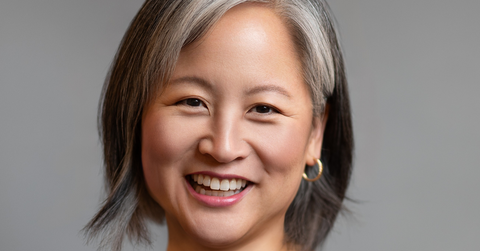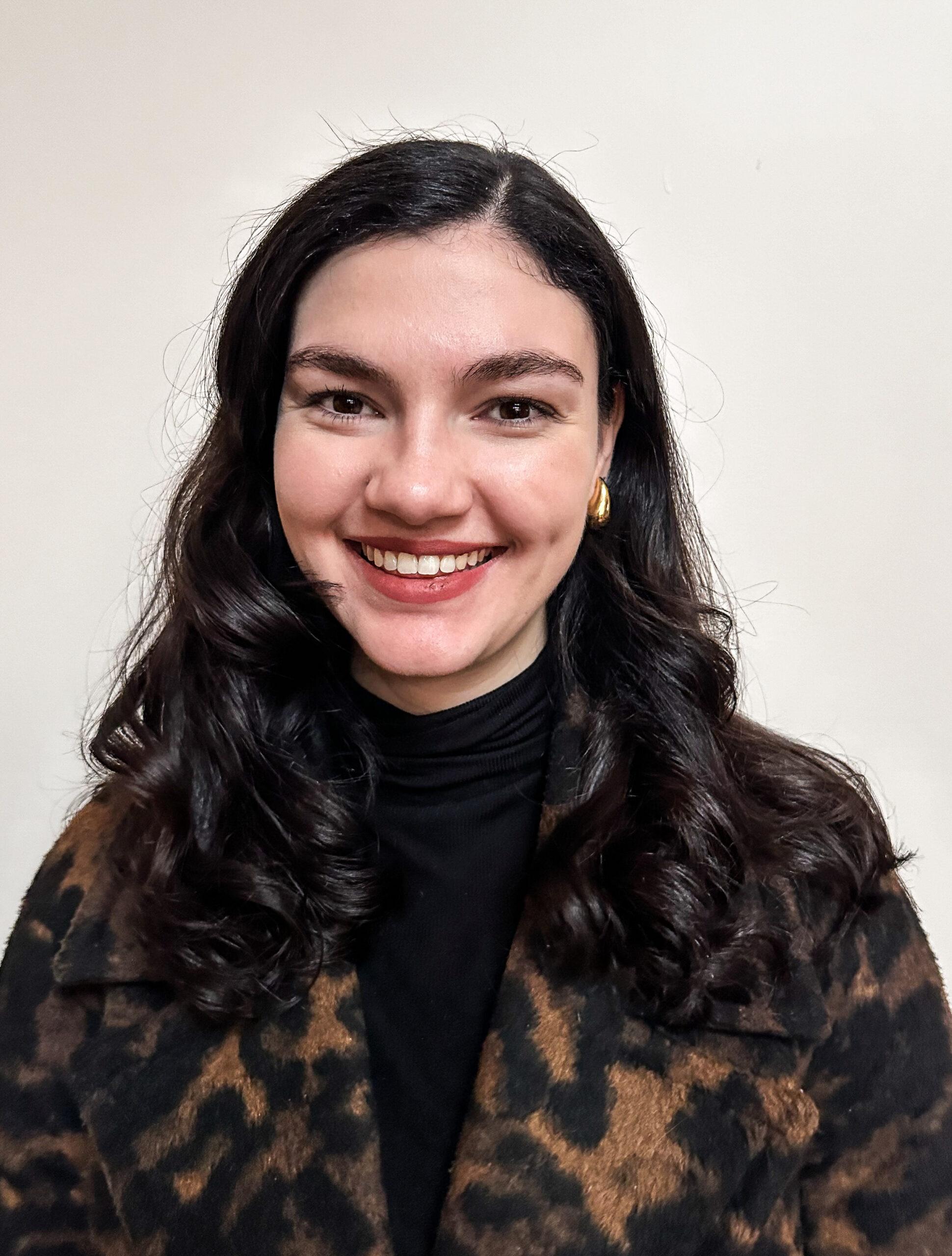Sally Kim has spent three decades watching the publishing world transform around her, but the veteran editor and publisher has learned to embrace change rather than fear it. Now serving as publisher at the prestigious Little, Brown and Company—the 187-year-old house behind classics like Little Women and The Catcher in the Rye, Sally brings a unique perspective to an industry in constant flux.
From the rise of social media book communities to the explosion of “romantasy” fiction, she’s witnessed readers seize control of literary conversations once dominated by traditional gatekeepers.
It’s a shift that might unnerve some industry veterans, but Sally sees opportunity where others see disruption. Having discovered and nurtured numerous bestselling authors, including Gillian Flynn, whose debut, Sharp Objects, Sally famously acquired after reading it overnight and feeling “scared to pitch it” because it was unlike anything she’d seen before, she understands that great publishing has always been about taking risks on singular voices.
In an interview with Her Agenda, Sally shares insights on everything from building editorial teams to advice for aspiring authors, revealing how one of America’s oldest publishing houses is adapting to meet readers where they are in an increasingly digital world.
Her Agenda:How has the publishing industry changed most significantly since you entered it, and what changes do you anticipate in the next decade?
Sally Kim: I came up through editorial. Publishing for as long as I have been, people have always said, ‘Oh, you should have been here. You should have been here in the golden age. It’s not fun anymore, and the sky is falling and accounts are closing, and eBooks are going to take over the printed book, et cetera, et cetera.’
There’s always been the sense that we’re on the precipice of some sort of major change from which we can never return.
Now we can actually target consumers. In the old days, you would put out an ad or you would get a nice review and hope that people would go to the bookstore and buy your books. Now we can literally target them online and see where their shopping patterns are and where they buy their books, and where their communities huddle, and try to target them that way. But what’s interesting is that really what drives how people are finding books is still very much word of mouth.
It’s still very old-fashioned in that it really does start with a book. One thing I always talk about with authors is that we work almost a year in advance in terms of having a finished book in hand and all the things we do along the way to kind of set that book up. Yes, technically, maybe we could print it and distribute it in six weeks, but really, what that year is, is pressing the copy of the galley into everyone’s hands and librarians and booksellers and media and getting that running start and getting people excited. That has not changed at all. It’s just how we do that, and the devices through which we do that have changed.
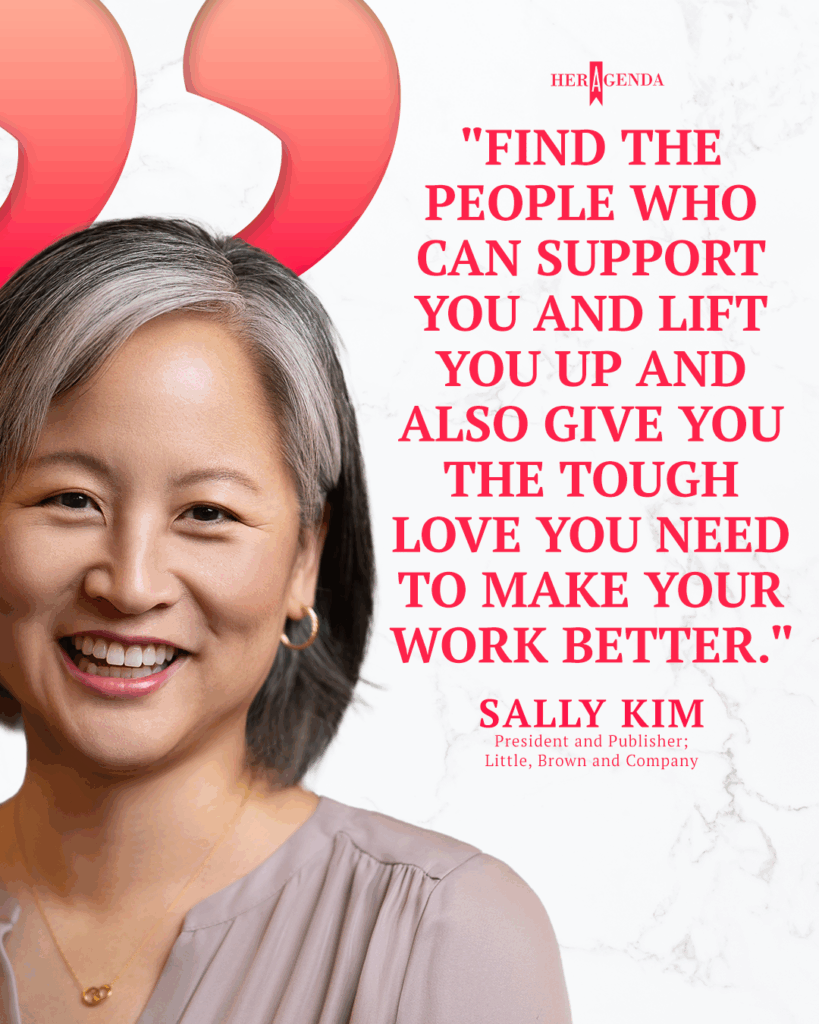
Her Agenda: You’ve discovered and nurtured numerous authors who became bestsellers. What do you look for when evaluating a debut manuscript?
Sally Kim: I came up through editorial, and I’m a publisher now, but I still edit a few books on my own. This may say sound cliché, but I would say every book that I have gone after, whether or not I bought it or won the auction or whatever it was, I knew from page two that it was good.
You’ve done this where you’ve read a novel where your friend has said, ‘This is the best thing I’ve ever read.’ And you’re thinking, Oh, I don’t know, and vice versa. And I think that’s what’s great about fiction is that much of it is a reflection of what you bring to the table as a reader.
I love working with debut writers; I’ve worked with a lot, and I’ve published a lot of debut novels. One of the through lines for me personally, if I’m going to spend time reading eight to 10 drafts, spending my weekends and nights editing it, pressing it into people’s hands and having it reflect a part of my list, I think that’s what we’re lucky to do as editors and publishers.
Now, it might be a category of publishing before, or a category that’s very popular, but it’s a certain perspective is a certain voice, it’s a certain combination of voices, it’s a twist on the mother’s story, or revealing or amplifying a certain emotion that I’ve never quite seen exactly put in a certain way. I am looking for that, because I’ve read a lot of books and a lot of manuscripts over my time. I selfishly do this, because I get to spend time on the books I want to spend time with that I would read on vacation myself. I don’t want to read the same thing over and over; I want something that’s very uniquely and singularly new.
And one example is I acquired Gillian Flynn’s first book, which is called Sharp Objects. And that’s a book I always talk about, because I have a lot of examples, but that’s a very vivid one in that it was such [a different kind of book]. I remember taking that [manuscript] home that night, reading it overnight, and coming into the office and saying, ‘I’m a little scared to talk about this book, because I don’t know what everyone will think.’ We’ve never published anything like this before. I don’t really see a lot of examples of it out in the marketplace written by young women writers. It’s dark, but it’s also very human, and I just remember that feeling of being nervous to pitch it at my editorial meeting.
And I always say that that’s actually kind of a sign that you should go for it. Because that means if it’s new to you, and you’ve never seen something like this before, chances are it’s going to be groundbreaking for someone else as well. That’s what we all want to do is publish new stories and new voices.
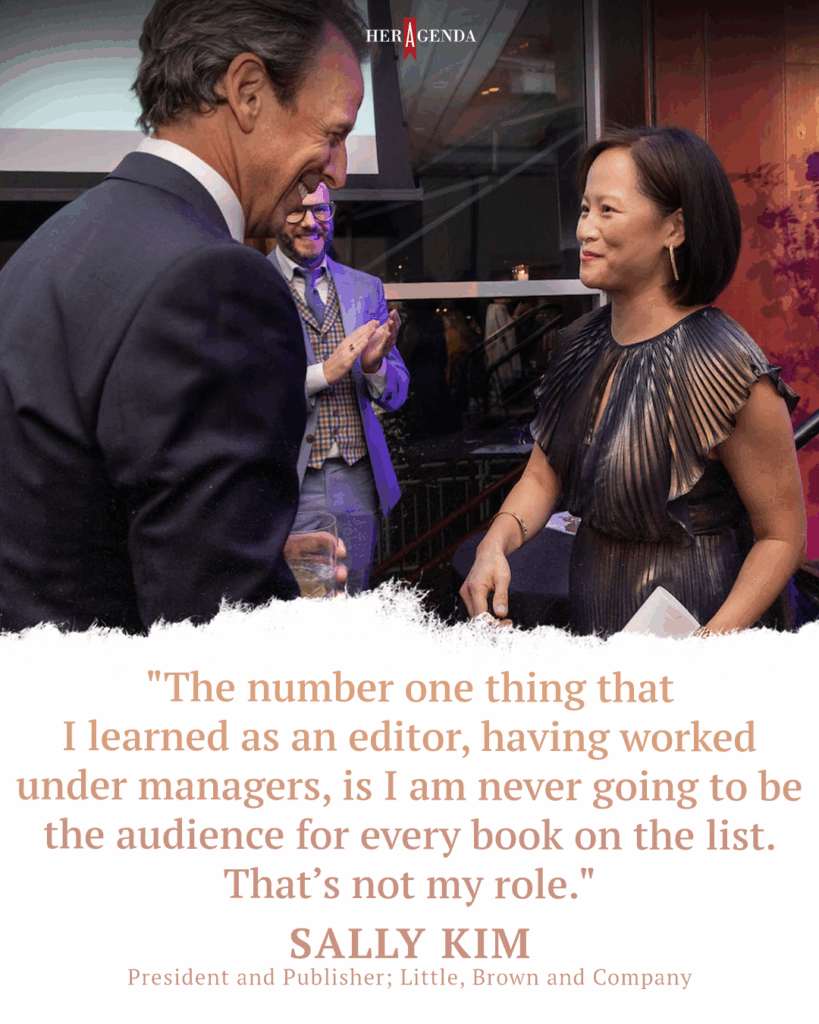
Her Agenda: How do you approach long‑term author development?
Sally Kim: Right now, the market is tough, and people’s time is occupied by many different choices of media. You’re having a disconnect in terms of how you can reach and influence. In the old days, you would buy space because you would say, oh, you’d walk into a bookstore and say, ‘Wow, Tom Clancy, those are 10 books right in the front, when I walk in, that must be a big bestseller, I’m going to buy that book.’ I mean, that was part of marketing back then.
We don’t have some of the tools we used to have. It really relies on knowing your audience and connecting with your audience, and then not taking that audience for granted.
Sally Kim: What advice would you give to aspiring authors trying to break into the market today?
Her Agenda: First and foremost, write the book that only you can write. I know that sounds again, a little bit like a soundbite, but I do mean that because again, what I said earlier about how readers are anointing books themselves now, the thing that really stands out to people is when there is a voice or a story or a perspective that feels [like] ‘I’ve never thought about that topic in that way before.’
So, I would say really lean into the specificity of your own experience or your imagination or your way of seeing the world. Don’t try to write to trends because the trend will be over by the time your book comes out. And more importantly, it probably won’t be authentic.
I think readers and editors, and agents can sniff that out. We know when someone’s writing to try and catch a wave versus when someone is just writing because they have a story inside them that they absolutely must tell. That’s the first thing.
The second thing I would say is find your people. Whether that’s through a writing group, whether that’s through taking classes, whether that’s through even just being active in the literary community or in book talks or whatever—find the people who can support you and lift you up and also give you the tough love you need to make your work better.
Writing is such a lonely business, and it can be very hard to keep going when you’re just in your own head all the time. I think building a community around yourself is not just important for your mental health, but also for your growth as a writer.
And then third [is] perseverance. That’s probably the number one thing that separates published authors from unpublished authors. It’s not talent, it’s not genius, it’s not MFA degrees—it’s the ability to keep going after rejection.
Every single writer I’ve worked with, even the huge bestsellers, had a moment where they thought about giving up. Maybe they got rejected by 20 agents. Maybe they had a first book that didn’t sell. Maybe they got terrible reviews. But they kept going.
I would say, write the best book you can, be open to revision and feedback, find your people, and don’t give up. I know that’s easier said than done, but I truly believe that the world will always make room for great stories. If you have one, keep at it.
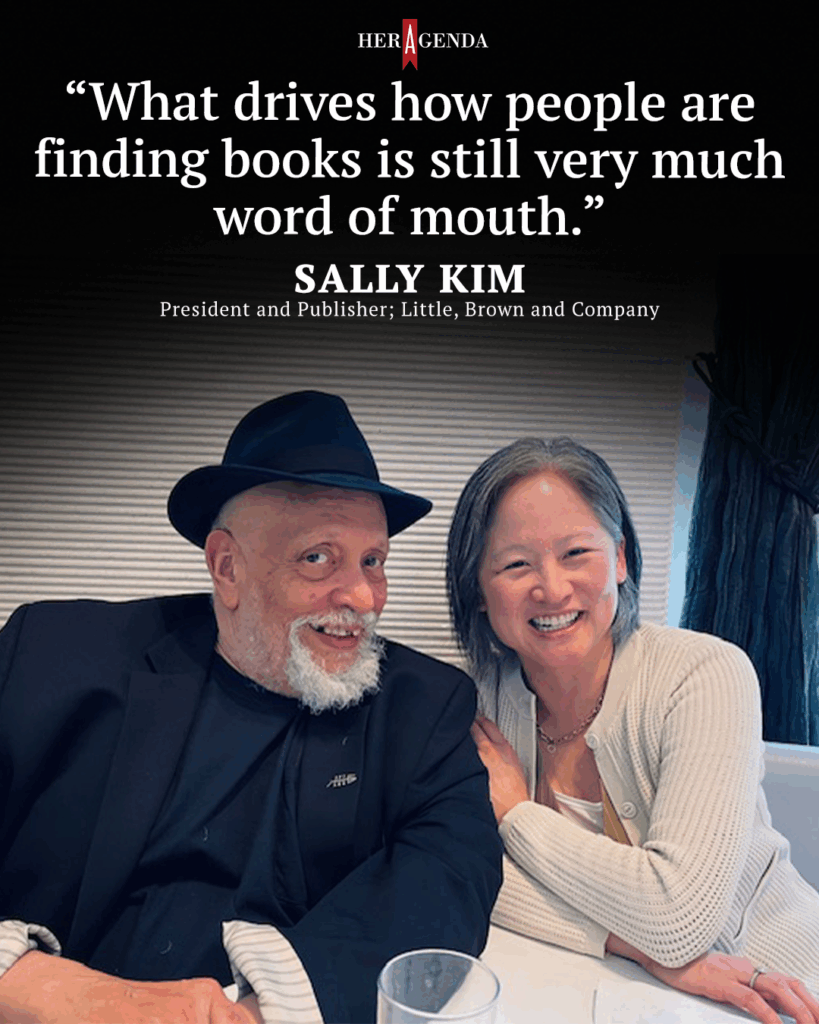
Her Agenda: What’s your approach to building and leading editorial teams? How do you foster creativity while maintaining commercial focus?
Sally Kim: I think about this a lot. I’ve worked with editorial groups of all kinds, small, big, and medium. And the one thing that I really have taken, because I never really wanted to be a manager, I just wanted to work on my own books. The first time I was an editorial director working with a group of editors, I was really scared, because I thought, I don’t think I’m gonna be good at this. And also, I don’t want to be responsible for their books and their happiness and their career growth. I just want to focus on my list. But what clicked for me is that I actually enjoyed it, because you end up having a different relationship with each one of your editors, because each editor needs a different thing from you. And the number one thing that I learned as an editor, having worked under managers, is I am never going to be the audience for every book on the list. That’s not my role.
My role is not to say this is a good book. I need the editors to be experts in their areas, and then to help them do their thing. So, having an editor whose books come to you, and a finance book editor, I’m just making this up. I don’t read finance books. But as long as they’re super well‑versed in the category, they read everything under the sun, they know their stuff, they get in the best projects from agents, they’ve published in that category super well all these years, and they’re the best in the business.
My job is then to help get them to just continue doing that, and publish best‑in‑class books, and books that move the conversation in their category. So, I know that sounds obvious, but I think there have been times where I’ve worked with people who want them to sort of be clones of their own tastes, and what they want to do. And that, to me, is the most boring.
It would be very boring if we at Little, Brown only published books that I liked, frankly. Because I don’t know everything, I’m not the audience for everything, and also, we have to leave room for surprises, and we have to leave room for things that we don’t know. And the only way to do that is to have a staff of editors who are experts at what they do, and their different categories, and are making us expand the list of what we publish, and expanding who we’re publishing to.
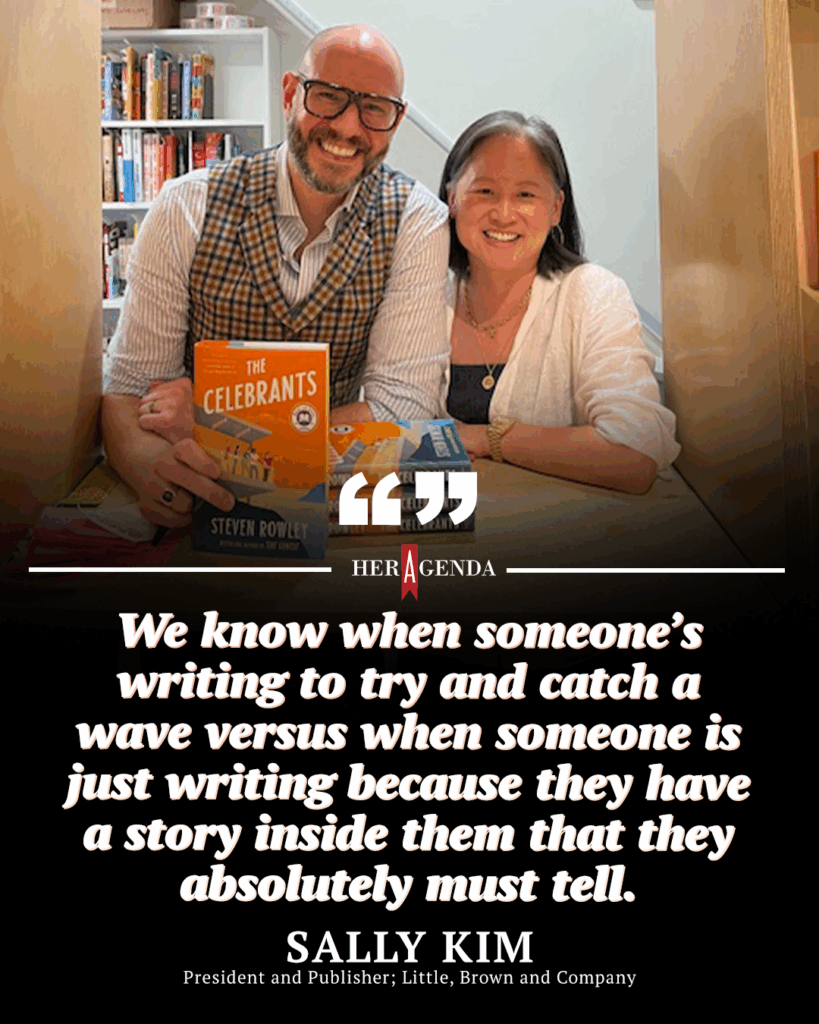
Her Agenda: What’s the most rewarding aspect of your work, and what keeps you passionate about publishing in the book industry after many years?
Sally Kim: I’m really mindful that it’s one of the rare creative industries.
Ultimately, the goal, if you get enough experience and credibility and success with what you do, you get to choose the projects that you work on. And that your unique eye, or speciality, or your point of view in life, or life experience sets you up specifically to represent that book, and to have that book represent you.
It’s similar to having little pieces of your heart out there in the world in the form of books. And to say, I helped that book, or I helped that author, and that book is not only great, but it represents something about me that I want you to know.
That’s pretty cool. I don’t think that that’s something I necessarily really understood until I was kind of knee‑deep in this job.
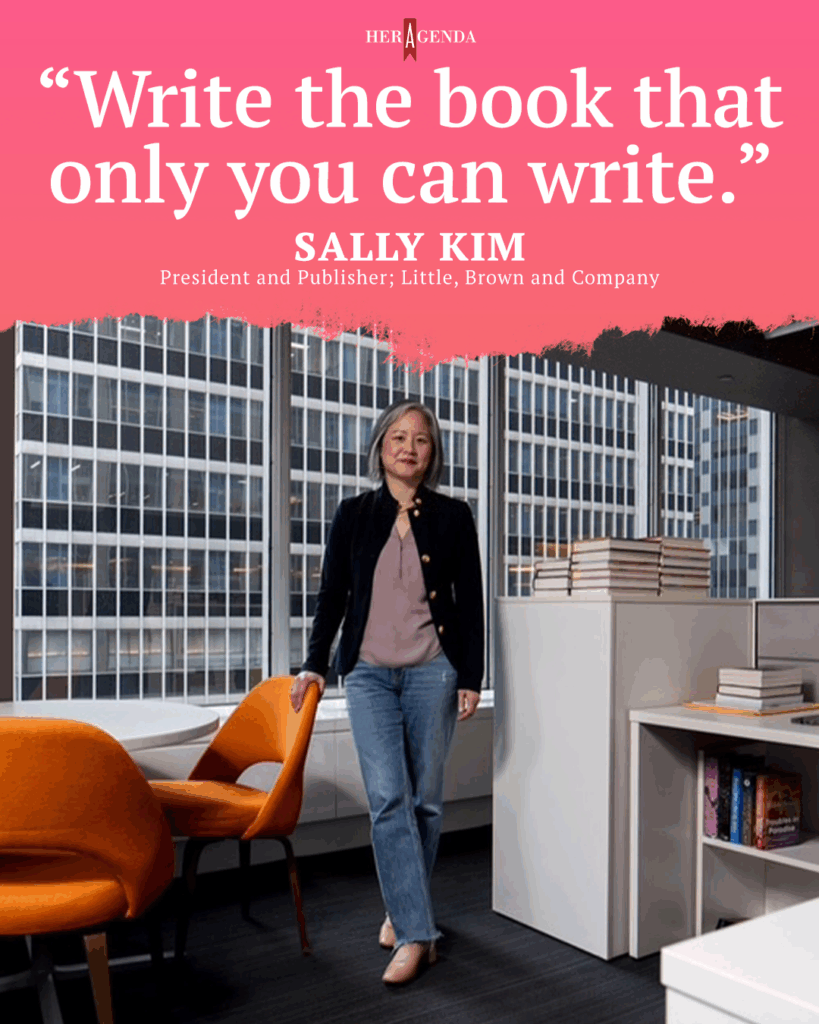
Her Agenda: What types of stories or voices are you most excited to discover in the coming years?
Sally Kim: Little, Brown is the oldest publisher in the industry, founded in 1837, and the list of classics and the backlist gems is just, it goes on and on and on and on.
Little Women, Catcher in the Rye, just such an illustrious story list. And that’s a big part of why I took this role, just the privilege of working at a place like Little, Brown. I never thought I would get to work at a house such as Little, Brown.
And for many reasons, because when I was coming up, as I always say, there’s a very good chance that a Little, Brown Book has touched your life at some point, because of its role in the culture, and not only being part of the conversation, but leading the conversations out there in the world, whether it’s fiction, nonfiction.
Being here [now] and working with a team [where together] we get to decide what a Little, Brown Book is for the future, the near future, the long-term future, the future classics, is such a privilege. We’ve worked really hard. We know how to make books, we know how to work with writers, edit books and produce them and market them and publicize them. I still sort of have to pinch myself. I don’t take it for granted that we get to anoint in a way or discover and give space for voices that maybe were overlooked before, because they weren’t part of a certain vision of what a literary book was.
[Editor’s note: This interview has been edited for length and clarity. This feature is sponsored by Hachette Book Group.]

